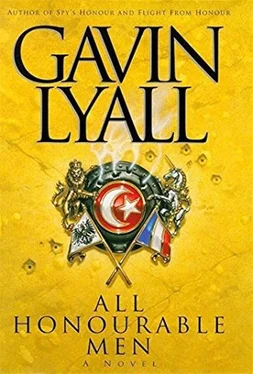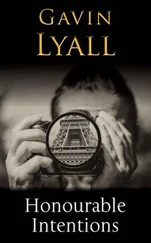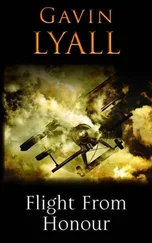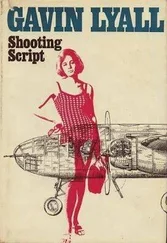Gavin Lyall - All Honourable Men
Здесь есть возможность читать онлайн «Gavin Lyall - All Honourable Men» весь текст электронной книги совершенно бесплатно (целиком полную версию без сокращений). В некоторых случаях можно слушать аудио, скачать через торрент в формате fb2 и присутствует краткое содержание. Год выпуска: 1997, Издательство: Bloomsbury Publishing, Жанр: Шпионский детектив, Исторический детектив, на английском языке. Описание произведения, (предисловие) а так же отзывы посетителей доступны на портале библиотеки ЛибКат.
- Название:All Honourable Men
- Автор:
- Издательство:Bloomsbury Publishing
- Жанр:
- Год:1997
- ISBN:нет данных
- Рейтинг книги:5 / 5. Голосов: 1
-
Избранное:Добавить в избранное
- Отзывы:
-
Ваша оценка:
- 100
- 1
- 2
- 3
- 4
- 5
All Honourable Men: краткое содержание, описание и аннотация
Предлагаем к чтению аннотацию, описание, краткое содержание или предисловие (зависит от того, что написал сам автор книги «All Honourable Men»). Если вы не нашли необходимую информацию о книге — напишите в комментариях, мы постараемся отыскать её.
All Honourable Men — читать онлайн бесплатно полную книгу (весь текст) целиком
Ниже представлен текст книги, разбитый по страницам. Система сохранения места последней прочитанной страницы, позволяет с удобством читать онлайн бесплатно книгу «All Honourable Men», без необходимости каждый раз заново искать на чём Вы остановились. Поставьте закладку, и сможете в любой момент перейти на страницу, на которой закончили чтение.
Интервал:
Закладка:
“Probably your lads who did him in,” the Commander said cheerfully. “We shall miss him.”
“We shan’t, that’s for certain,” Kell said. “But I’m afraid it still wasn’t us.”
The Commander grinned at the Home Office. “Well, that narrows it down for you. Only Germany, France, Austria-Hungary, Russia and a few others to suspect.”
Sir Basil’s voice had become grave. “All highly amusing, gentlemen, but his death doesn’t fall to your charge. He’s my unsolved murder – and likely to be a highly publicised one, if the press get any inkling of his true job. They’re already aroused by the way he was killed, assassination-style.” He tapped the Evening Standard .
“Can’t you stifle those bloody editors?” the Commander asked. “I mean, ask for their responsible co-operation? It’s my Bureau which will suffer from this: other dealers getting wary of us, perhaps even blaming us for the murder. So, believe me, we’d very much like to see this solved. Only,” he added, “I don’t think it’s solvable.”
The Home Office consulted his notes. “I believe there was something about him picking up a poste restante letter . . .”
Sir Basil craned his skinny neck to summon the detective sergeant into action. Dix coughed and said: “We didn’t find anything that looked like such a letter on him, sir. One theory is that it might have been an introduction that he could show at the door of one of the ministries in Whitehall. And he left it there or destroyed it after his visit.”
The Home Office added this all up. “Then he could have visited a ministry last night, when you’d lost him in the fog?”
Sir Basil nodded and put on a slight smile. “There is, in fact, other evidence that he did.”
Everybody looked at him, puzzled. Then Ranklin said: “Money. I bet he had a lot of money on him.”
“Over ?200 in gold and bank notes. How big a secret does that suggest to you gentlemen?”
“Then,” the Home Office said, “surely all you have to do is ask around the ministries to find out which-”
“We have already asked the most likely – and they say they will, reluctantly, check. Whether anyone will admit they spent tax-payers’ money on such people . . . Would you?”
There was a silence. Then Ranklin asked: “Are you letting the newspapers know any of this?”
“We haven’t done so, not yet.”
Feigning hesitancy about telling Sir Basil how to run the Yard, Ranklin said: “Publishing the fact that he’d sold us a secret might nullify that secret’s value.”
The Commander nodded firmly. “Quite right. If – as a nation – we’ve gained something from his visit, let’s for God’s sake keep it, whatever it is.” He looked around, collecting agreement. “But does this mean he was killed for revenge?”
“Not necessarily,” Kell said. “It could still have been prevention – if he was killed by a foreign power. They needn’t know he’d already passed the secret on.”
There was another silence – a rather uneasy one on Sir Basil’s part, Ranklin thought. Perhaps he was torn between wishing it were a foreign power – what could he be expected to do against that? – and fearing public outrage that foreigners could do such things in London.
Rather too casually, Kell asked the Commander: “Will you know eventually who it was?”
“Oh yes. In a few weeks or months it’ll seep out on the grapevine. No proof, of course, but we’ll know .” But they were just showing off in front of the young Home Office. Gratifyingly, he gazed at them with horrified awe.
A slight wind had worked up around tea-time, thinning the fog. And although the wind had gone and there were now millions of coal fires adding their mite to the air, you could now see for ten or fifteen yards. The Commander paused on the steps of the club, perhaps calculating whether it was bad enough to excuse not going home. He could, rumour had it, always find somewhere to spend the night.
“Any private theories about Brock?” he grunted.
Ranklin, who had spent half the day trying to have a theory, shook his head. “None, sir.”
“Well, as I say, it’ll come out in the end.”
“I could do with it being a bit sooner. The Standard quoted the waiter as hearing me called ‘Captain’ and quite a good description of me.”
“We don’t have to be invisible in this business.”
“I’m thinking of Gunther’s own firm. They’ll be reading every last comma for hints as to what happened, they might recognise me and then think I was leading Gunther into a trap.”
“Aren’t you being overly imaginative?”
“They’re competent,” Ranklin said, “and they’re widespread. That’s why we have dealings with them.”
“What d’you want to do about it, then?”
But Ranklin, rashly, hadn’t thought that far. “Er. . . nothing dramatic, I suppose . . . But if we do come across any answer, I’d like approval to pass it on to Gunther’s partners.”
“You aren’t developing a sense of justice , are you?” The Commander eyed him closely. “It would be entirely inappropriate in your work. Now, for me, it would be rather suitable. They could say ‘He’s a swine, but a just swine.’ I’d like that. But I’m Chief of this Bureau and you’re not, and my sense of justice is all we need.”
“As evidence of our good faith?” Ranklin suggested. “For good future relations?”
The Commander was still looking at him. “Umm. Well, perhaps. . . Did you like this van der Brock?” he asked casually.
“Like him? I don’t think so, particularly . . . He was more like . . . family. One of us.”
That was just the sort of answer the Commander’s temper had been waiting for. “No he bloody well wasn’t! Only we are us.”
5
The fog cleared the next day and more typical March winds blew in. The railway companies found out where their trains were and began moving them to where they ought to be. Scotland Yard made no visible progress on the Gunther case and wished the popular papers would shut up about it. Ranklin surreptitiously opened a file on the case and kept it in the Registry – a single, albeit locked, bookcase – misleadingly labelled “Historical/Biblical Espionage”. The Commander believed he’d invented spying and wasn’t interested in history.
So Ranklin wasn’t worried that he’d found the file when he was called into the inner office. The Commander fluttered a message at him. “They want you at a meeting at the Admiralty – or rather, they want me or our Turkish expert.”
“Who’s ‘they’, sir?”
“It sounds like a conference of the powers: the Foreign Office and the India Office, as well. That’s why I’m not going myself.” He grinned. “They may have wheeled out the big guns to bully me into something and they can’t if I’m not there. So just say what an interesting idea and you’re sorry you can’t take a final decision yourself.”
“The India Office?” That Office handled, as one would expect, Indian affairs, and Ranklin hadn’t thought of it as being interested in Turkey. But, old-maidishly, India could imagine enemies at very long range. Until now, it had usually been Russia, but with her more-or-less an ally, perhaps the Turkish Empire – stretching to the Gulf of Persia – had been promoted to bogeyman.
“Yes, them. The only other clue is that they expect you to be au fait with the Baghdad Railway. What d’you know about it?”
Ranklin shuffled his thoughts. “It adds on to the existing line from Constantinople into central Turkey. They’re building an extension through the mountains on the south coast and down across Syria to Baghdad. And probably further, to Basra and perhaps the Persian Gulf-”
Читать дальшеИнтервал:
Закладка:
Похожие книги на «All Honourable Men»
Представляем Вашему вниманию похожие книги на «All Honourable Men» списком для выбора. Мы отобрали схожую по названию и смыслу литературу в надежде предоставить читателям больше вариантов отыскать новые, интересные, ещё непрочитанные произведения.
Обсуждение, отзывы о книге «All Honourable Men» и просто собственные мнения читателей. Оставьте ваши комментарии, напишите, что Вы думаете о произведении, его смысле или главных героях. Укажите что конкретно понравилось, а что нет, и почему Вы так считаете.











